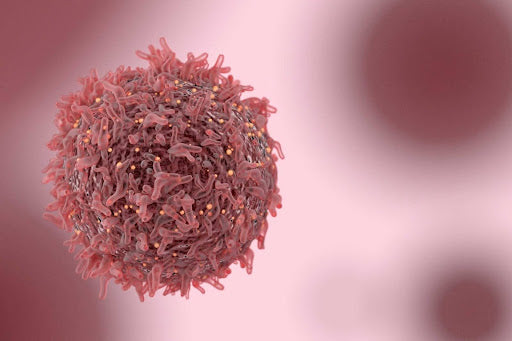
Cancer is a complex and challenging disease that affects millions of lives worldwide. While we often associate cancer with factors like genetics, lifestyle choices, and environmental exposures, there's another crucial player in all these factors within the cancer story: inflammation.
Although acute inflammation is part of our body's natural response to injury or infection, when acute inflammation stays around for longer than it should, you’ve now got chronic inflammation. This may even be low-grade inflammation where the inflammation is subtly affecting your health, but you’re playing off noticeable symptoms as its just one of those things.
Chronic inflammation plays a significant role in the development and progression of cancer. But how does this process unfold, and what does it have to do with a little-known protein called IL-6? Let's dive in and uncover the link between inflammation and cancer, with a focus on IL-6.
- What is IL-6?
- IL-6 and the link with cancer
- Why is IL-6 a player in cancer?
- Therapies targeting the inhibition of IL-6
- What you can do to support calming IL-6
Delve into understanding inflammation, here. (link to blog on Inflammation - https://www.salvacare.co.nz/blogs/news/what-is-inflammation)
What is IL-6?
Firstly, let's understand inflammation. When our body detects harmful stimuli, such as pathogens or damaged cells, it launches an immune response to heal and protect itself. This response involves the release of various signalling molecules, including cytokines like IL-6, which act as messengers to coordinate immune activity.
Now, here's where things get interesting – while acute inflammation is typically a protective mechanism, chronic inflammation can fuel cancer development. When your body can no longer shut down the acute production of IL-6, your body goes into a self-perpetuating cycle. Imagine a persistent fire smouldering in your body, that never fully extinguishes, this is chronic inflammation. Over time, this will damage DNA, promote the growth of abnormal cells, and create an environment ripe for cancer to thrive.

The link with IL-6 and cancer
IL-6 is a type of cytokine – a protein that regulates inflammation and immune responses. In normal circumstances, IL-6 helps our body combat infections and repair damaged tissues. However, when IL-6 cytokines are overly expressed, IL-6 production spirals out of control, contributing to cancer progression through:
- Stimulating cancer cell growth and survival.
- Inducing changes in the cell function, facilitating metastasis.
- Promoting angiogenesis enabling tumours to be supplied with nutrients and enabling metastatic spread.

Figure2: From Biological effects of interleukin 6: Clinical applications in autoimmune diseases and cancers
Research has shown elevated IL-6 levels within tumour microenvironments are associated with cancer cell growth promotion, inhibition of apoptosis, and enhanced survival across various cancers such as Multiple Myeloma (MM), lung, breast, ovarian, and colorectal cancers. IL-6 exacerbates disease progression, reduces responsiveness to treatments like chemo-endocrine therapy in metastatic breast cancer, and correlates with chemo-resistance in ovarian cancer.
IL-6 overexpression in MM leads to increased bone loss and drug resistance, while in prostate cancer, it fuels androgen-independent cell growth and worsens outcomes.
Why is IL-6 a player in cancer?
One reason lies in its ability to manipulate the tumour microenvironment – the surrounding cellular landscape where cancer grows and spreads. IL-6 when over expressed creates an inflammatory environment that nurtures cancer cells, providing them with the fuel they need to proliferate and metastasize.

New therapies targeting inhibition of IL-6
Understanding the intricate interplay between inflammation and cancer, particularly the role of IL-6, has opened new avenues for treatment and prevention. There are medical therapies available that target the inhibition of IL-6 signalling pathways, which look to disrupt the inflammatory cascade to halt cancer progression.
However, in the research we have seen to date results are mixed. Why? Especially given excessive production of IL-6 is linked to cancer progression and poorer health outcomes.
Could it be because there is some benefit to our body having a small amount of IL-6?
As with many biological functions within the body not everything is good or bad this is true for IL-6. In acute inflammation IL-6 is shown to help regulate the bodies acute-phase response from inflammation, wound healing and hepatic regeneration. However, the protective role of IL-6 in maintaining tissue integrity becomes harmful to the body when it is no longer able to shut down IL-6 signalling and there is then an overproduction of IL-6. Thus, IL-6 starts to harm the body when the response self-perpetuates, your body is losing the ability to balance its own immune function.
Would calming the IL-6 response provide better health outcomes overall than inhibiting the IL-6 response altogether?
What can you do to calm IL-6?
When it comes to supporting our body, taking gradual steps to change habits is always the wisest approach. Attempting too much at once often results in no progress, so our recommendation is to start small, fostering lasting habits for better long-term health.
To support a reduction in inflammation and IL-6, consider starting with one or two of the following six key strategies:
- Embrace a balanced diet by reducing processed foods and sugars while increasing intake of whole foods. Begin with small changes, such as adding an extra ½ cup of vegetables gradually and ensuring daily protein intake (1-1.5g per kg of ideal body weight) aligns with your body weight.
- Steer clear of tobacco, vaping, and excessive alcohol consumption. These substances elevate inflammation levels; if you need assistance in quitting, reach out for support.
- Prioritize stress management through simple breathing exercises. Start with practicing box breathing 1-2 times daily—inhale for 4 seconds, hold for 2 seconds, exhale for 8 seconds, and hold for 2 seconds.
- Incorporate moderate exercise into your routine, as it aids in reducing inflammation and supporting overall health. If intense exercise isn't feasible, start with isometric exercises—contracting muscles for 10-30 seconds, resting, and repeating.
- Ensure quality sleep, as inadequate sleep increases inflammation. Consider supplementing with Great Lakes Collagen before bed if sleep troubles persist explore further support options through a free discovery call with us.
- Consider taking ModeraFlam, a product designed to calm IL-6 and alleviate inflammatory symptoms. For mild inflammation, the recommended dosage is 2 capsules daily on an empty stomach, preferably before bedtime. For severe inflammation, reach out to discuss personalized dosing options.
By implementing these strategies gradually, you can support your body's efforts in calming IL-6 levels and promoting overall well-being.
Not sure where to start, book a FREE discovery call today
While the link between inflammation and cancer may seem daunting, it also presents potentially unexplored opportunities for you or your loved ones with a cancer diagnosis to dig a little deeper to see if calming the IL-6 response along with modulation of cell cycle is an appropriate personalised treatment plan for you or them.
Not sure if these products are suitable for you? Book in a FREE discovery call

Reference
- Jean-François Rossi, Zhao-Yang Lu, Michel Jourdan, Bernard Klein; Interleukin-6 as a Therapeutic Target. Clin Cancer Res 15 March 2015; 21 (6): 1248–1257. https://doi.org/10.1158/1078-0432.CCR-14-2291
- Gadó K, Domján G, Hegyesi H, Falus A. Role of INTERLEUKIN-6 in the pathogenesis of multiple myeloma. Cell Biol Int. 2000;24(4):195-209. doi: 10.1006/cbir.2000.0497. PMID: 10816321.
- //www.frontiersin.org/journals/endocrinology/articles/10.3389/fendo.2018.00788/full
- Smith PC, Hobisch A, Lin DL, Culig Z, Keller ET. Interleukin-6 and prostate cancer progression. Cytokine Growth Factor Rev. 2001 Mar;12(1):33-40. doi: 10.1016/s1359-6101(00)00021-6. PMID: 11312117.
- Culig Z, Puhr M. Interleukin-6 and prostate cancer: Current developments and unsolved questions. Mol Cell Endocrinol. 2018 Feb 15;462(Pt A):25-30. doi: 10.1016/j.mce.2017.03.012. Epub 2017 Mar 16. PMID: 28315704.
- https://www.uptodate.com/contents/interleukin-6-inhibitors-biology-principles-of-use-and-adverse-effects#H3491803430
- https://www.sciencedirect.com/science/article/pii/S0304419X21001372#:~:text=Abstract,and%20inhibition%20of%20cell%20apoptosis.
- Waldner MJ, Foersch S, Neurath MF. Interleukin-6--a key regulator of colorectal cancer development. Int J Biol Sci. 2012;8(9):1248-53. doi: 10.7150/ijbs.4614. Epub 2012 Oct 24. PMID: 23136553; PMCID: PMC3491448.
- Zhang GJ, Adachi I. Serum interleukin-6 levels correlate to tumor progression and prognosis in metastatic breast carcinoma. Anticancer Res. 1999 Mar-Apr;19(2B):1427-32. PMID: 10365118
- //www.sciencedirect.com/science/article/abs/pii/S1043466614006577#:~:text=The%20acute%20response%20to%20IL6,many%20cells%20of%20the%20body.



